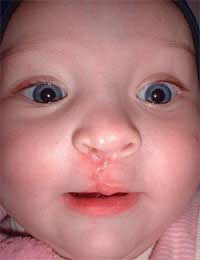Cleft Lip or Palate

A cleft lip and/or palate can cause significant obstacles for children's speech. However, though cleft lips and palates are fairly common around the world, the general population is often unfamiliar with these birth defects.
Below are some basic answers to frequently asked questions about cleft lips, cleft palates and speech.
What is a Cleft Lip?
A cleft lip is a birth defect in which the soft tissues of the lips did not grow together during pregnancy. This cleft usually looks like a space or gap between the skin of the upper lip that extends vertically up to the nose. In general, boys are affected by cleft lips more often than girls are affected by cleft lips. Cleft lips can be present alone or in conjunction with cleft palates.What is a Cleft Palate?
A cleft palate is a birth defect in which the soft tissues of the palate did not grow together during pregnancy. This means that there is often an opening left between the roof of the mouth and the nasal cavity, though some children may experience clefting at both the front and back of the palate while others may only have partial clefting of these tissues. Regardless, a cleft palate means that the tissues at the top of a child's mouth haven't fused properly. More girls than boys have cleft palates only (without cleft lips as well).How Does a Cleft Lip or Palate Affect Speech?
Cleft lips and/or palates often cause children to have speech problems, though with surgery and therapy a significant number of these children can overcome or adjust and have fairly normal speech abilities by about age five. Speech delay is common in children with clefts, and many children learn to make vague sounds such as grunts instead of actual words when they have trouble speaking.Cleft palates in particular lead to speech problems as the top of the mouth is not available for the tongue to hit in order to make specific words and sounds. Also, because children with cleft palates can not close off their nasal cavities during speech their voices often sound highly nasal. Such children may also hurt their vocal chords by putting excess pressure on them as they try to build up enough air pressure in the mouth to speak, and they may become fatigued while talking for similar reasons.


Re: The Lidcombe Program
My 3 year old has started to stammer about 5 weeks ago and has progressed very fast and now it affect every word she pronounces and I am…
Re: Child Abuse and Speech Disorders
I stopped talking to my dad in my normal voice when I was in grade 1 after he hit me because I couldn’t understand my…
Re: New Earpiece to Help With Stammering
I am interested in being assessed for the use of the SpeechEasy hearing device and would be grateful if someone could…
Re: The Lidcombe Program
I don’t know what else to do ..
Re: New Earpiece to Help With Stammering
I have a Stammer and have always struggled with my speech and I think this would really help me and so many others.
Re: The Lidcombe Program
Sir I only stutter when speaking to others. Not when, I speak to myself can you tell me what's the problem.
Re: The Lidcombe Program
I am 23 years I am supering from stammer please how can I get vaccine for ti
Re: Expressive Language Disorder
I have a lot to ask . Please reach out. Thank you
Re: The Lidcombe Program
My age is 32...when IAM speaking difficulty to say word...IAM disappointed in my life only reason is stammring..plz help me...
Re: The Lidcombe Program
Is there any advice for a child who has been really forward with his speech since 2 he has stung sentences together so clearly. He has now…